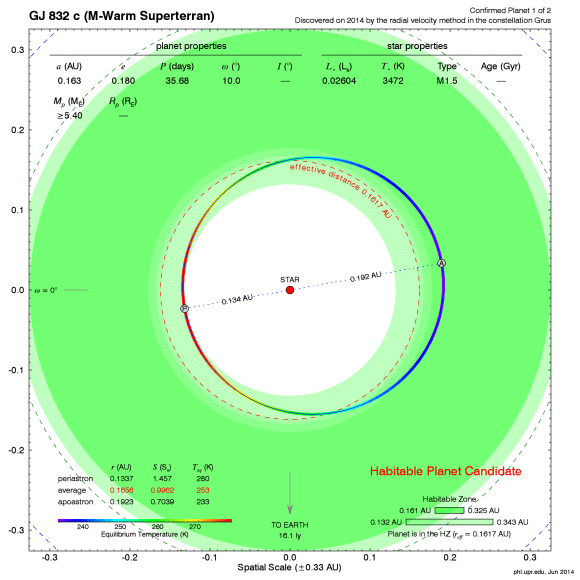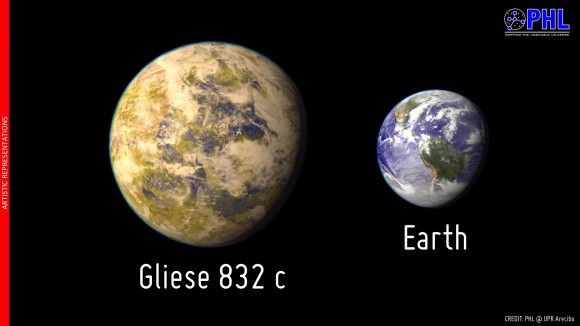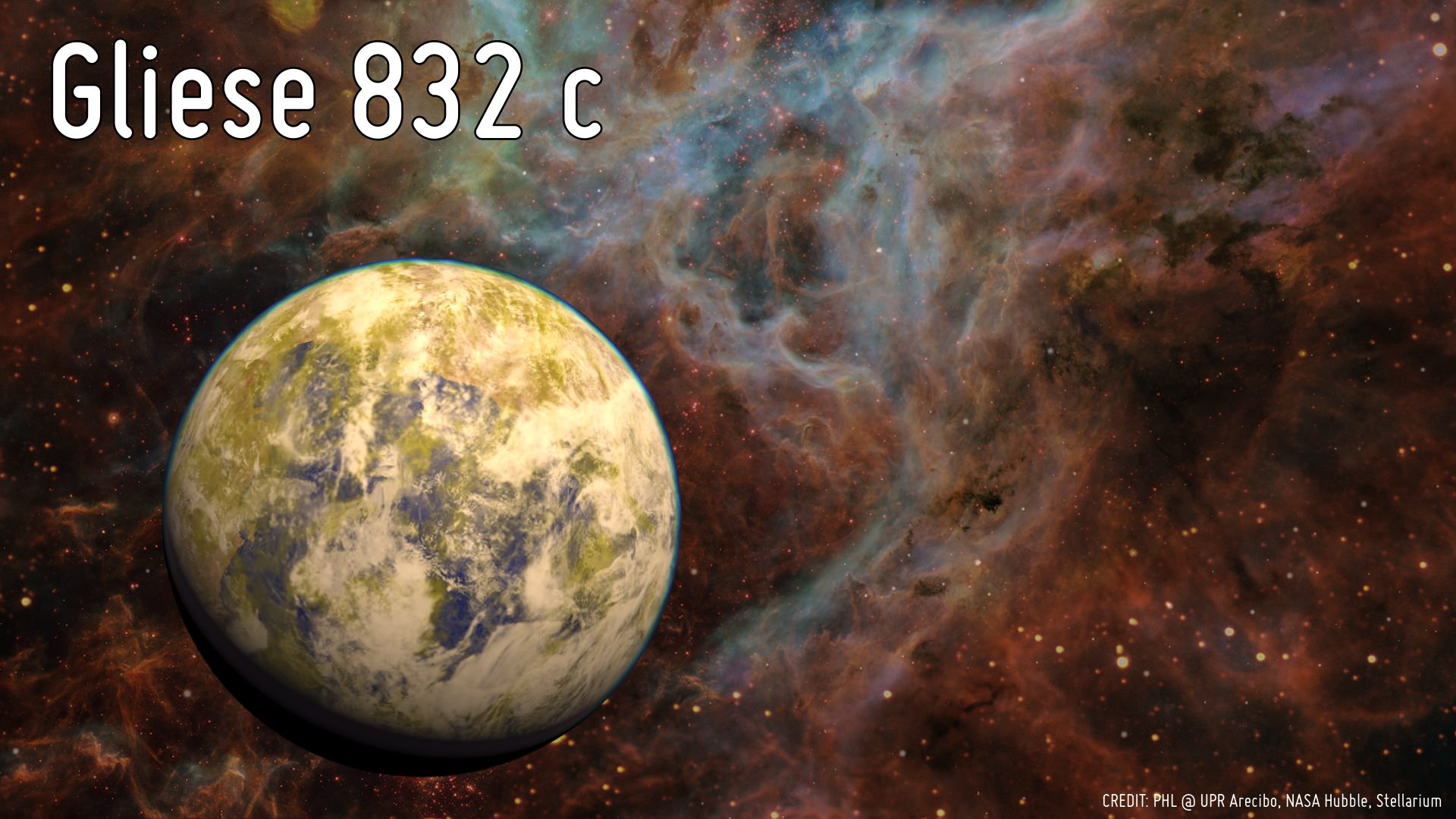On a clear night, you might be able to spot the red dwarf star Gliese 832 through a backyard telescope, as it is just 16 light years away. Today, astronomers announced the discovery of super-Earth planet orbiting this nearby star and say it might be the best candidate yet for habitable world.
Gliese 832c was spotted by an international team of astronomers, led by Robert A. Wittenmyer from UNSW Australia. They used high-precision radial-velocity data from HARPS-TERRA, the Planet Finder Spectrograph and the UCLES echelle spectrograph. This star is already known to have one additional planet, a cold Jupiter-like planet, Gliese 832 b, discovered in 2009.

Since red dwarf stars shine dimly, the habitable zones around these stars would be very close in. Gliese 832c complies with an orbital period of 36 days (it’s orbital companion Gliese 832 b orbits the star in 9.4 years.)
The newly found super-Earth has a mass at least five times that of Earth’s and the astronomers estimate it receives about the same average energy as Earth does from the Sun. “The planet might have Earth-like temperatures, albeit with large seasonal shifts, given a similar terrestrial atmosphere,” says a press release from the Planetary Habitability Laboratory. “A denser atmosphere, something expected for Super-Earths, could easily make this planet too hot for life and a ‘Super-Venus’ instead.”
Using the Earth Similarity Index (ESI) — a measure of how physically similar a planetary mass object is to Earth, where 1 equals the same qualities as Earth — Gliese 832 c has an ESI of 0.81. This is comparable to Gliese 667C c (ESI = 0.84) and Kepler-62 e (ESI = 0.83).
“This makes Gliese 832c one of the top three most Earth-like planets according to the ESI (i.e. with respect to Earth’s stellar flux and mass) and the closest one to Earth of all three, a prime object for follow-up observations. However, other unknowns such as the bulk composition and atmosphere of the planet could make this world quite different to Earth and non-habitable.”

In their paper, Wittenmyer and his colleagues noted that while Solar Systems like our own appear — so far — to be rare, the Gliese 832 system is like a scaled-down version of our own Solar System, with an inner potentially Earth-like planet and an outer Jupiter-like giant planet. They added that the giant outer planet may have played a similar dynamical role in the Gliese 832 system to that played by Jupiter in our Solar System.
Certainly, astronomers will be attempting to observe this system further to see if any additional planets can be found.
If you’re interested in trying to see this star, here’s our guide on red dwarf stars that are visible in backyard telescopes.


So it is or it isn’t … It isn’t. Seems like the Atheist science community is so desperate to make earth less special and unique in a lame effort to disprove God that these stories of “earth like” planets are becoming the pinnacle of back in your face jokes.
You all do know that finding another earth will not make your point right? It will actually reinforce the existence of creationism. LOL
“The atheist community”. What does this article mention about god or creationism? I know I’m feeding the troll here but I would love to hear why you think that the people studying exoplanets has anything to do with creationism, or some imaginary scheme to denounce it. I can assure you scientists don’t worry themselves with how their observations affect religious theology. I can only infer from your post that you believe in creationism. How do you reconcile this with the science and observational astronomical discoveries we are unveiling everyday?
You got Religion and you got science. In the old days, the Religious people were also the educated people. But Religion and science were still two different things.
Nowadays, science has advanced with the culmination of knowledge over the ages and the well over a 100 million people studying and adding to that knowledge.
Revel in it.
PoliTecs, I am sure that there are a number of scientists that believe in a god. It may or may not be your particular god of choice, and even if it is, they may not subscribe to the creationism that you seem to believe in. Surprise, surprise, there are countless people that identify as Christians that do not subscribe to a literal interpretation of the bible. If you actually care to do some research, as I have, and I am not a scientist, BTW, I am an ex Christian cum Agnostic, you would understand that our Galaxy, the Milky Way is really nothing special in a Universe (Multiverse?) of tens of billions, if not hundreds of billions of galaxies. Even in our own galaxy, we are not located in any special area that would indicate that there is anything unique about our little blue planet. In other words, there is nothing that indicates we are special. There is nothing that indicates our little oasis in the vastness of space is unique or special. Nothing. If you believe in a god, I would think it would be more awe inspiring to think that ours is one of countless civilizations populating the vast, almost infinite reaches of our Universe.
Well said.
We’re special, we have to say thank you to whatever or whoever created the universe for locating us very, very, very, very far from main stream of stars. (milky ways/black holes and the likes)
@Davies: What arrogance!
– _We_ don’t have to bow to anyone posing as our owners, and especially not imaginary agencies.
– _We_ are not special. You are erroneously making selection bias, our survival making us able to observe our survival, as support for something else.
And to round off, you are trolling a science astronomy blog with magic suppositions while demonstrating that you know nothing about astronomy. (We are not in the thick of the Milky Way, among main sequence stars, and nomad black holes … really?)
Theology, in general, is metaphysical in nature, and is a branch of philosophy, which has nothing to do with suppositions of magic. The Intelligent Design Argument can be argued for or against from quite a scientific point of view, and, again, has nothing to do with magic. Cosmological observations, in fact, can be interpreted to strongly support that argument, with the exception of the Multiverse proposal. Even then, metaphysical questions pertaining to the existence of a Universe and of sentient existence could be raised in relation to the Multiverse as well.
@MichaelL: Politec is correct though that science is encompassing a skeptical, amagic, community.
The existence of empiricists that allow a special pleading on a specific area does not mean science is compatible with magic – it is obviously not – it means psychology is complicated.
In point of fact, the evidence (given our own existence) suggests that the Universe appears to be “hard-wired” for life. As best we can tell, it was a natural process occurring over billions of years.
But as far as I can see, none can explain “why” the Universe should harbor any kind of life at all. Why life? To reply “why not” is an answer of sorts, but one that clearly expresses ignorance and is unscientific.
The scientific community is certainly no where even close to being in agreement as to what “life” actually IS. They cling to the notion that the inanimate and inert can by some “magical”, as of yet totally unknown process, become animate and “aware”. The seek an origin where none may actually exist. They simply don’t know.
And neither are the mindless religious proponents any closer to understanding what makes “life” living. They are as clueless as any other. They cling to outdated manuscripts from times past which they accept literally. Unquestioningly and ignorantly.
This debate between two hopelessly ignorant “camps” is farcical.
Your words in this comment showing how you believe that science works speak volumes about the wildly active imagination you possess that allows you to find more credence in magical Bronze Age super beings who live in the sky and control everything than in something that actually produces tangible products such as computers and internets which allow you to spew your ignorant venom at people who are merely trying to understand through observation how everything ACTUALLY works. Kudos on having the demonstrable brain power of a child…
Hey everyone, when an idiot drops a flaming bag of poo on your porch, you don’t stomp on it. Let it go.
Perhaps the wisest thing I’ve read this week! Only then you’re porch goes up in flames… LOL! No, really, you ARE correct, though. The best way to combat a Troll is to not cross his bridge! 😉
I am a scientist who still believes in God. The two things are most certainly not mutually exclusive In a complex world there is room for both. Science can neither prove or disprove the existence of God any more than it can currently find evidence proving or disproving the existence of extra dimensions, dark energy, the multi-verse or string theory. I can say with certainty that science can disprove some stubbornly held religious doctrine such as creationism. I believe without question that God wants us to gain knowledge about the universe. Going back as far as Socrates, mankind has realized that knowledge vanquishes ignorance which is a pervasive cause of needless harm. Aside from cultural ignorance which has led to genocide, simple knowledge of the danger posed by a fault line like the San Andreas leads to people earthquake proofing their homes in the area, ultimately saving countless lives when the next big one hits. It stands to reason then that those who persist in ignorance and profess it are in fact in league with the devil and doing his work in God’s name. Such is my view of people who preach against vaccinations. Regarding creationism, it is time that fundamentalists accept the truth regarding radioisotope dating techniques and see the bible for the allegory that it is regarding many of the old stories.
“I am a scientist who still believes in .” Worse than being a grownup believing in Santa Claus, you are a self professed scientist believing in magic. And what would your specific religion has to do with that?
Science and magic agency ideas are certainly mutually exclusive, starting from thermodynamics moving to cosmology. The latter implies that creationism, the belief in a magic agency interacting with the universe during its emergence, is more insanely erroneous than homeopathy. Homeopaths claims their purported “magic seed” volume is potent after being diluted 10^30 times, creationists claims theirs is potent after being diluted 10^100 times during inflation – whereupon the local universe and all structure formation emerges out of spontaneous, non-interacting quantum fluctuations of the inflaton field. Hence creationism and belief in magic agencies overall (in the subsequently magic free local universe) is now known to be the most insanely erroneous idea ever invented by man.
But you are welcome to it. Just lay off the theology on science sites: “Science can neither prove or disprove the existence of God”. How is your professed science compatible with theology, as science never, ever, “prove” something? And why do you comment on theology instead of science here?
And especially annoying, commenting with the theology of the blatantly stupid NOMA claim, which has always failed in test. Science rejects – and magic is robustly rejected since the 70’s. (That’s my estimate for the earliest time when you could use thermodynamics to reject a generic magic agency claim from hypothesis testing the amassed examples of testably non-magic systems.)
Comment editor fail. Let me try again:
“I am a scientist who still believes in [magic agencies]”. Worse than being a grownup believing in Santa Claus, you are a self professed scientist believing in magic.
Your anti-science trolling on an innocent science blog is definitely not reinforcing the existence of creationism. It is immoral people like you that makes deconverts from religion, see Dawkins’s Convert’s Corner.
Typical religious troll comment. Yeah the “atheist science’ community is so obsessed with “proof & evidence” unlike certain people who just claim and blindly believe without any facts to back up their delusions!
Typical religious troll comment. Yeah the “atheist science’ community is so obsessed with “proof & evidence” unlike certain people who just claim and blindly believe without any facts to back up their delusions!
Read more: http://www.universetoday.com/112806/nearby-super-earth-is-best-habitable-candidate-so-far-astronomers-say/#ixzz35uFgewDM
Neither the non-uniqueness or quantity of life or lack there of quantity of life proves or disproves creationism. Show me where in the Bible it expressly says that Earth is the only place god created life.
God created a wonderful Universe. It would be a shame if we were the only ones in all this Universe that could appreciate it. Or multiverse for that matter.
We have one example of the natural emergence of life. Naturally another example would further weaken creationism.
But please, don’t discuss theology on a science blog. Who cares about the exact wording in a myth?
Anyway, back on topic.
The article is titled “Nearby Super-Earth is Best Habitable Candidate So Far, Astronomers Say”. I don’t see where that comes from based on an Earth Similarity Index (ESI) of .81 it is third in line behind Gliese 667C c (ESI = 0.84) and Kepler-62 e (ESI = 0.83). Not what I consider the best candidate for habitability.
Maybe this one is slightly less unreachable without an Alcubierre drive than the others, sorry I don’t have time to sort through the exoplanet catalogue and check.
What has reachability to do with astrobiology?
Whether it’s the best candidate for a habitable planet anywhere, it’s certainly a great one if you want to imagine the aliens looking back at us. Our Sun would shine brightly in Gliese 832c’s night sky.
This object looks like a prime object for a viewing with the suite of instruments envisioned for the James Webb Space Telescope! Got my vote anyway. But I’ll only start getting excited when we see lines of methane, oxygen, nitrogen, carbon dioxide or other biological markers in the spectroscopy.
Or… http://journalofcosmology.com/Panspermia12.html
Considering the size of this planet it likely would retain a dense atmosphere. Considering it is in the hot portion of the “habitable zone” there is a strong possibility it would resemble Venus with a runaway greenhouse effect. There are other factors which could mitigate this from happening such as if has a great deal of water by mass, the star has a lot of flare activity stripping away atmosphere, or if the planet does not have a magnetic field to shield it from stripping of its atmosphere.
It is a possible habitable (as per ESI), not likely (as per the conservative HZ). I think that measuring against anything else than ESI is premature, until we get up to 0.9 ESI or so. Then we can start to differentiate in the filter used to pick the most interesting planets to observe further.
Of course some of the medium scale ESI planets will be Mars like, with a potential remnant of life in the crust. But those should be passed off to a similar index accounting for the crustal HZ, which some estimates are way wider outwards than the surface HZ.
The magnetic field is rather protecting from water loss, in the form of hydrogen loss after photodissociation. Venus has scant magnetic field while it has a much denser atmosphere than Earth, but it has lost most of its hydrogen specifically. And while some models puts superEarths as dynamo less, if they are too large, most models implies stronger fields than Earth’s.
Another possibility, though it may be rare, is a superEarth born with about Earth type atmosphere pressure. We have one very recent example of a planet that would be enough for a gas giant core (17 Earth masses) but is known to have a terrestrial type atmosphere.
Thinking more, the way the ESI statistics stack up currently, maybe we have reached the point (at ESI > 0.8) where further differentiation makes sense. The HEC, the ESI home site, has indeed suggested a biological productivity index as among the next filters. We have to wait and see if it catches on.